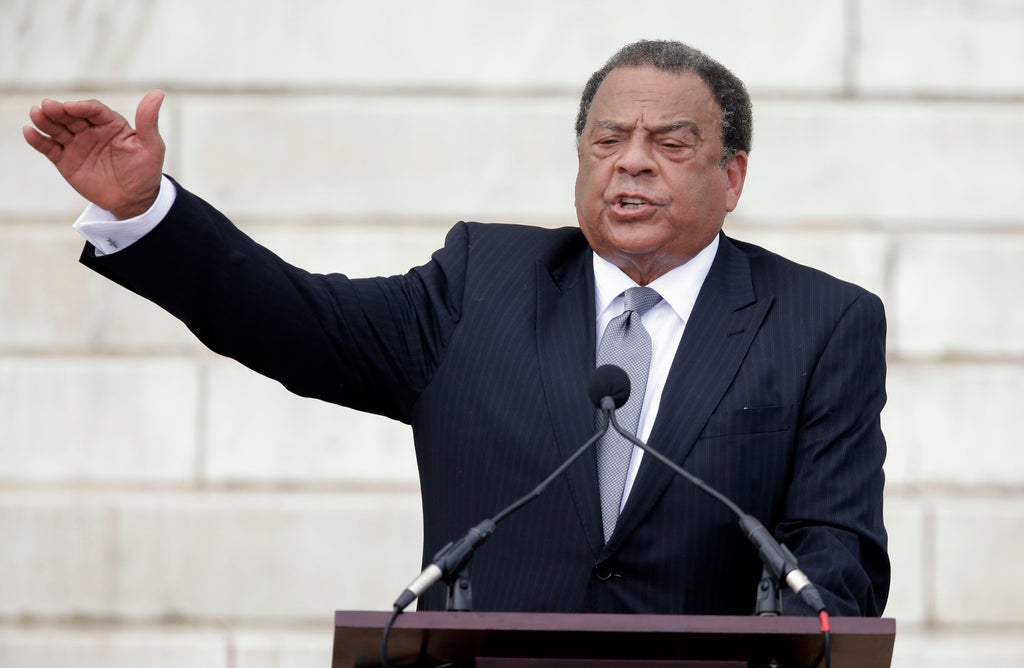
As he approaches 90, civil rights icon Andrew Young is turning to his late friend and colleague, the Rev. Martin Luther King Jr., for inspiration.
During the civil rights struggle, King would say that “'we probably won't make it to 50,'” Young recalled in a January opinion column in The Atlanta Journal Constitution. “'But those who do have got to make sure to make it to 100, because there's a whole lot of work to be done.'”
Young will celebrate his 90th birthday this month with a string of events that continue his long fight for equity and inclusion. Over four days starting Wednesday, the former congressman, United Nations ambassador and Atlanta mayor will deliver a sermon about harmony, attend a walk aimed at fostering unity and host a gala to raise funds for economic development and food security.
Young believes the nation is more divided today than in the 1960s, said Gaurav Kumar, president of the Andrew J. Young Foundation. The theme for the events is therefore “peace and reconciliation.”
Kumar called Young's life an “ocean of peace” and said the goal of the birthday celebration is to showcase Young's accomplishments and inspire younger generations.
Young is among the last surviving members of King's inner circle. He served as executive director of the Southern Christian Leadership Conference, the civil rights group that King founded, and was with King when he was assassinated in 1968 at the age of 39.
Young went on to become the first Black person from Georgia sent to Congress since Reconstruction when he was elected to the U.S. House in 1972. President Jimmy Carter later appointed him ambassador to the United Nations, where he served until his resignation in 1979 amid public uproar over a clandestine meeting with members of the Palestine Liberation Organization.
As mayor of Atlanta in the 1980s, Young is credited with boosting the city's stature. Atlanta hosted the Democratic Convention in 1988 and then the Summer Olympics in 1996. Young used his international reputation to help Atlanta beat out other cities for the games.
“There would have not been the Olympic games in Atlanta, Georgia, had it not been for Andrew Young,” said Billy Payne, who led the committee responsible for organizing the event. Payne added, “He saw in the Olympic effort the ability to bring our city together in a way that we could serve as a shining example for the rest of the world."
Payne and Kumar spoke on a Zoom call in February that was organized to promote Young's birthday events. Ernie Suggs, author of an upcoming book about Young, was also on the call and described Young as the type of person who “is everywhere, knows everybody.”
"Each chapter of his life can be a whole life,” Suggs said.
For his birthday celebration, Young will deliver a “peace and reconciliation” sermon on Wednesday at Atlanta’s First Congregational Church, his home church since 1961. The 1.5-mile (2.4-kilometer) walk will begin at Centennial Olympic Park — a legacy of the 1996 games — in downtown Atlanta the next day. A statue of Young will be unveiled as part of that event.
On Friday, an exhibit about Young's life will open at Millennium Gate Museum, also in Atlanta. Suggs' book — “The Many Lives of Andrew Young” — will also be available for sale. It includes stories Young shared, photos and an introduction by Carter.
The gala will take place on Saturday, Young's actual birthday.
Young has acknowledged thinking about death as he approaches 90. On a podcast in January, he told former Obama administration strategist David Axelrod that King would often talk — and joke — about death, which King called the “ultimate democracy.”
“He said, 'You don't have anything to say about where you die or how you die,'” Young said. “'Your only choice is what is it you're willing to give your life for.'”







